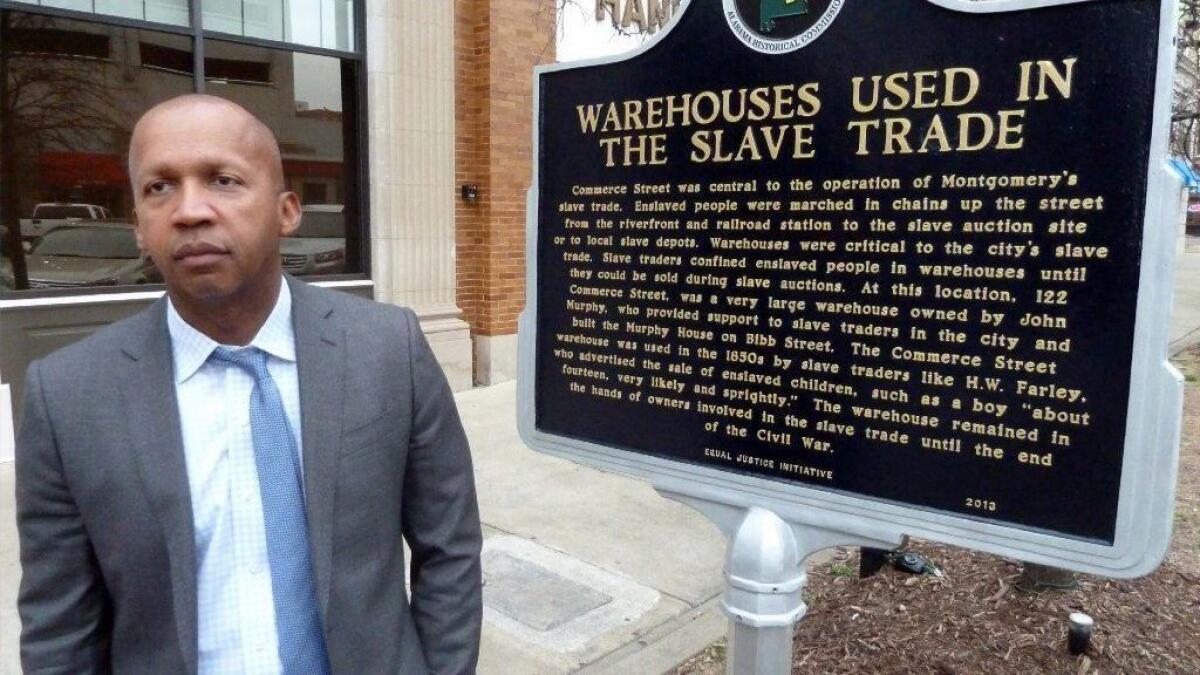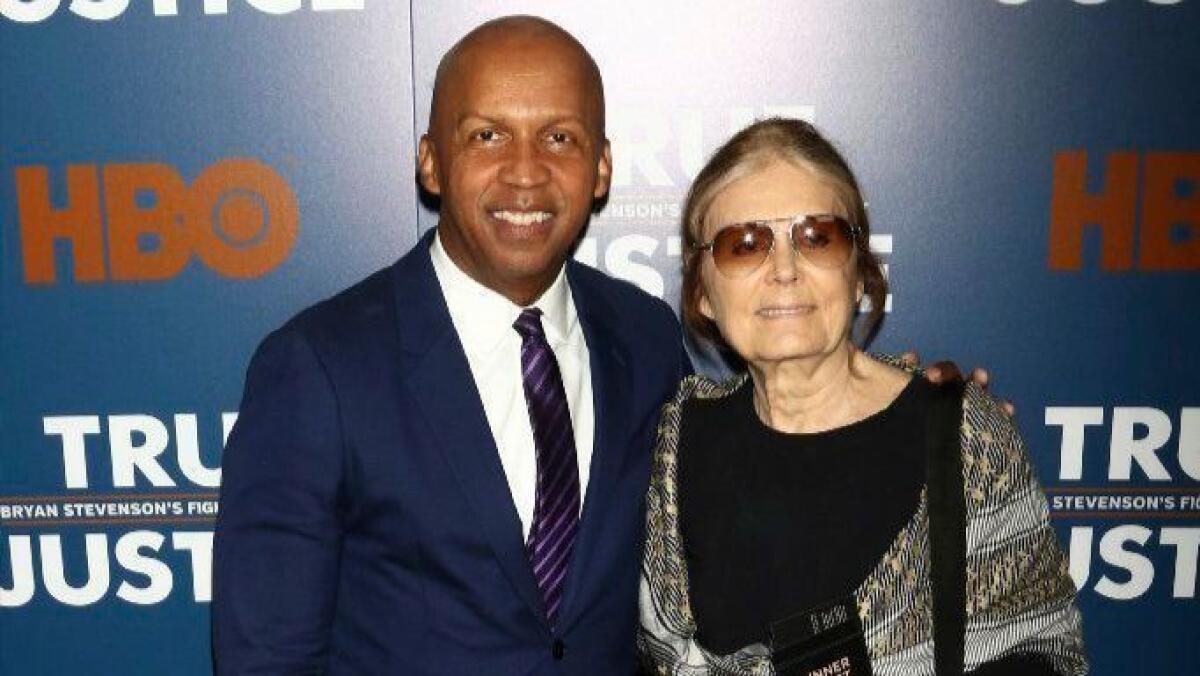Civil rights hero Bryan Stevenson gets movie star moment with HBO documentary ‘True Justice’

- Share via
Reporting from New York — Whether you’re running a major studio or see a movie once a year, you know who Steven Spielberg is. You might be a classical music impresario or a death-metal junkie, but you still know the name Yo-Yo Ma. And if you’re involved in criminal-justice reform, death-penalty appeals, poverty law and the struggle for racial justice in the U.S. courts, you certainly know Bryan Stevenson. But otherwise, you might say, “Huh?”
That may be changing. When “True Justice: Bryan Stevenson’s Fight for Equality” debuts on HBO tonight, June 26th (alongside a limited theatrical run to qualify for awards consideration), it will showcase the work, and secondarily the life, of the best-known unknown in American law.
For the record:
2:00 p.m. June 26, 2019This article says that a Warner Bros. film adaptation of Byran Stevenson’s bestseller, “True Mercy,” will open next year. The correct title is “Just Mercy.”
Stevenson, founder of the Equal Justice Initiative in Montgomery, Ala., has argued five cases before the U.S. Supreme Court, including one that resulted in a ban on mandatory sentences of life without parole for children 17 and under. He and the EJI have won reversals, relief or release from prison for more than 135 wrongly condemned death-row inmates. Stevenson has gotten 35 honorary doctorates and a MacArthur “genius” award. A Warner Bros. film adaptation of his bestseller, “True Mercy,” will open next year with Stevenson played by Michael B. Jordan.
But one of the most remarkable things about the “True Justice” documentary, directed by Peter Kunhardt and his sons George and Teddy, is that it exists at all.
“It’s always been about the work for Bryan,” said the Ford Foundation’s Tanya Coke, who has known Stevenson since the ’80s, “not about him or his hero’s profile. Though in many ways that’s what he is.”
REVIEW: ‘True Justice: Bryan Stevenson’s Fight For Equality’ focuses on ideals »
Stevenson had been approached about making films before, but “to be honest, our approach has always been pretty covert,” Stevenson said during a recent interview. “Filmmakers have always wanted to focus on litigation and that never seemed in the best interests of our clients. We’re very protective of our clients.”
Over the last 10 years, Stevenson said, he’s had to adjust. “It’s become clearer to me that if we don’t do more work out of court to change the way people think and talk about and understand these issues, our work in court is not going to be effective.”
That realization prompted him to write a book, do a TED talk and create the Legacy Museum and the National Memorial for Peace and Justice in Montgomery, testaments to the history of slavery, racial inequality and lynching. “Ten years ago, I couldn’t have imagined doing these things. But they’re critical to the approach we want to have.”
When it came to a documentary, the Kunhardts seemed a good fit, thanks to Peter Kunhardt’s 2018 “King in the Wilderness,” a film about the Rev. Martin Luther King Jr.’s final 18 months, which had been produced by George and Teddy Kunhardt and executive produced by writer Trey Ellis and HBO’s Jackie Glover, who are also aboard “True Justice.”
“Jackie Glover, at HBO, was the person I was talking to and a person I trusted,” Stevenson said. “And ‘King in the Wilderness’ was admired by a lot of people I respected, including Harry Belafonte and John Lewis. So that made me feel comfortable.”
Comfortable enough to open up in a way Stevenson followers will find somewhat startling. Until he went to Harvard Law School, he tells the camera, he had never met a lawyer. Growing up in a close-knit, black area of Delaware, he had limited familiarity with outsiders, though one early encounter remains memorable: Taken by their mom on a one-time trip to Disney World, Bryan and his sister were excited because the trip included a motel, with a pool. When they finally arrived, they jumped right in — and all the white kids were pulled right out.
“What’s wrong?” Stevenson asked. A white father, looking down at him, answered, “You’re what’s wrong,” and used a racial epithet.
That story, according to Peter Kunhardt, got placed where it’s placed in the film toward the end of the editing process, “the reason being that we wanted to convey to the audience that this isn’t just history, but a very personal and poignant story told by someone who’s been through it.”
It had taken two years to make “True Justice,” Kunhardt said — “two years of gaining trust” — and 10 hours of interviews. “He initially was steering us toward the historical narrative,” the director said of his subject, “but he also peppered it with childhood stories, stories about his life — which he always wanted to be secondary to the work of EJI. But I think we found a happy balance.
“We kind of went in [to the process] taking a Hippocratic oath — first do no harm.”
Asked whether it was strange, pouring out his heart to the camera, Stevenson agreed it was. “I’d been very reluctant to provide the kind of access I provided to them,” he said of the Kunhardts. “But I guess I’ve become more open to talking honestly about all this stuff. Frankly, I’m getting really tired of living with the burden that’s created by our history of racial inequality. I sometimes say to people that it’s exhausting, having to keep navigating it.
“It breaks my heart having to still say to black or brown kids that it doesn’t matter if you’re kind or hardworking, you’re still going to go places where you’re going to have to navigate the danger of being killed; you’re going to have to be in total control when a police officer suspects you. I just feel like it’s gotten to a point in this conversation where more has to be said. And it’s increasingly personal.”
It’s always been personal. Back in 1986, when they were both “young pups,” Coke recalled that she and Stevenson were both at “an extremely underattended rally” in Atlanta, protesting Georgia’s application of the death penalty. Stevenson gave Coke a ride back to her hotel.
“He was driving a beat-up equivalent to a Toyota Corolla,” she said. “There was no radio, and papers were scattered all over the floor. When I expressed surprise that he would have left his car unlocked on a street in downtown Atlanta, he laughed and said that it gave him a perverse pleasure to know that would-be thieves sometimes rummaged around the car but found nothing to steal.”
Later, she said, “I looked over at him and asked him how long he planned to do this work. I was imagining that he would say five years, tops; capital defense work was so stressful, and he had a degree from Harvard and could have made a career anywhere. But instead he answered, ‘As long as it takes.’ ‘As long as what takes?’ I asked. And he replied, ‘As long as it takes to end the death penalty in America.’
“I was just floored. I thought, ‘We’re not going to see that in our lifetime.’ But I don’t think that part of it matters to Bryan.”
RELATED: Civil rights lawyer seeks to commemorate another side of Southern heritage: Lynchings »

------------
‘True Justice: Bryan Stevenson’s Fight for Equality’
Where: HBO
When: 8 p.m. Wednesday
Rating: TV-MA (may be unsuitable for children under the age of 17)
More to Read
Only good movies
Get the Indie Focus newsletter, Mark Olsen's weekly guide to the world of cinema.
You may occasionally receive promotional content from the Los Angeles Times.










